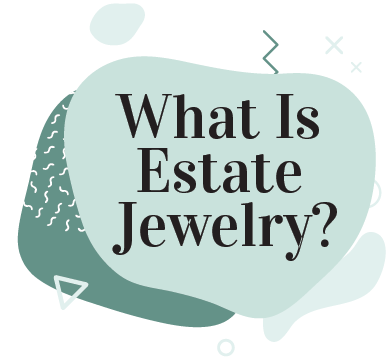What is Estate Jewelry?
How estate jewelry is different from vintage and antique jewelry
Estate jewelry refers to previously owned pieces, often rich in history and unique in design.
But understanding their true value and characteristics requires some expertise.
This guide will offer actionable insights and tips to help you make informed decisions when buying, selling ot caring for estate jewelry.
From assessing the quality to understanding the pricing, we’ll cover it all.

Understanding the Terms: Estate, Vintage, and Antique jewelry
The world of jewelry is filled with terms that can be confusing, especially when it comes to defining different types of pieces.
Estate jewelry is a term that encompasses any piece of jewelry that has been previously owned. It isn’t confined to a specific era or style but is characterized by its history of ownership. While estate jewelry can span across various periods, including antique and vintage, it also embraces more modern pieces.
On the other hand, vintage jewelry is defined by its age, specifically pieces that are between 20 to 30 years old but have not yet reached the century mark. These pieces often mirror the style and trends of distinct periods in history, such as the Art Deco or Retro era.
Antique jewelry is reserved for those pieces that have stood the test of time, being at least 100 years old. These items are not just old; they often hold historical significance and are highly regarded for their exceptional craftsmanship and rarity.
Distinguishing between estate, vintage, and antique is primarily a matter of age and historical context. While all estate jewelry has a history of ownership, it doesn’t necessarily mean it’s vintage or antique.
As we mentioned, vintage pieces are those that hail from a specific era within the past century, whereas antique pieces surpass that, with their age being over 100 years. The 100-year mark serves as the defining boundary between antique and vintage jewelry.
The age factor is pivotal when classifying jewelry. While estate jewelry can include both vintage and antique items, it’s crucial to remember that these terms are not synonymous.
The importance of proper classification cannot be overstated – correctly identifying a piece as estate, vintage, or antique can significantly influence its value, its allure to potential buyers or collectors, and the manner in which it’s marketed or collected.
What Makes Estate Jewelry so Attractive
Buying estate jewelry is an exciting and rewarding experience, offering unique opportunities to own beautiful, historic, and often more affordable pieces.
One of the most compelling reasons to opt for estate jewelry is the price advantage. Typically, these pieces are priced 20 to 40 percent lower than their brand-new counterparts, translating to substantial savings for the buyer. If you’re considering selling your estate jewelry, discover how to sell estate jewelry effectively.
Beyond the monetary benefits, there are significant environmental benefits to consider. Opting for estate jewelry means supporting a reduction in mining activities, which in turn leads to less pollution and waste. This choice underscores the importance of preserving our natural resources, as buying estate jewelry inherently promotes recycling and sustainability.
Another allure of estate jewelry is the opportunity to own a piece of history. These items often carry with them tales of the past, imbuing them with a unique charm and narrative that’s hard to replicate.
For those keen on carving out a distinct personal style, estate jewelry is a treasure trove. It offers unparalleled uniqueness and the chance to make a fashion statement. Unlike mass-produced items that can be found adorning numerous individuals, estate pieces allow wearers to express their individuality.
Lastly, the exceptional quality that estate jewelry offers cannot be overstated. These pieces are often testaments to remarkable craftsmanship, built to stand the test of time.
Estate Jewelry Prices
The price of estate jewelry can be as diverse and complex as the pieces themselves.
Various factors influence the cost, and understanding these can help buyers make informed decisions.
Let’s explore the elements that determine the price of estate jewelry and offer some practical tips for assessing value and navigating sales.
Understanding the Factors Influencing Price
- Age and Rarity: Older and rarer pieces, especially those from specific historical periods like the Edwardian era, may command higher prices.
- Condition: The state of preservation, including any repairs or alterations, can significantly impact the value.
- Craftsmanship: Exceptional craftsmanship, intricate designs, and attention to detail can add to the price. A piece with fine filigree work or hand-engraved details may be more valuable.
- Provenance: A piece’s history and previous ownership, especially if owned by a celebrity or historical figure, can increase its value. For example, a ring once worn by a famous actress might fetch a premium price.
- Materials: The type and quality of metals and gemstones used, such as platinum or rare gemstones, play a crucial role in determining cost.
- Brand or Maker: Signed pieces by renowned jewelry houses or designers often fetch higher prices. A necklace by Tiffany & Co., for example, may be more sought after than a piece purchased from an unknown place.
Inherited jewelry can also have significant value. Learn about the best way to sell inherited jewelry and what to do with inherited jewelry.
Price Ranges for Different Types of Estate Jewelry
- Estate Engagement Rings: Typically range from $500 to $5,000 and above, depending on factors like age, brand, and gemstone quality.
- Estate Necklaces: Can vary widely from $200 to $10,000, depending on materials like platinum and craftsmanship.
- Estate Earrings: Generally fall in the $100 to $3,000 range, with designer pieces commanding higher prices.
- Estate Watches: Prices can range from $300 for lesser-known brands to $20,000 for luxury brands, like Rolex or Patek Philippe.
Tips for Assessing Value and Making Wise Investments
Investing in estate jewelry requires careful consideration and understanding of the market. Here’s how you can assess value and make wise investments.
Consulting with appraisers is the first and most important step. It’s essential to engage with appraisers who hold certifications from reputable gemological institutes or appraisal organizations. Their specialized knowledge ensures that you receive an accurate valuation of the piece in question. Always insist on a written appraisal, detailing aspects like the materials used, craftsmanship, provenance, and an estimate of its value. For pieces that might be exceptionally valuable or unique, it’s advisable to seek multiple opinions, ensuring that the appraisal you receive is well-rounded and accurate.
A deep understanding of market trends can significantly influence your investment decisions. To gauge the market’s pulse, research historical prices by examining auction results and dealer prices for items similar to what you’re considering. Subscribing to industry publications, be it magazines, blogs, or newsletters, can offer valuable insights into prevailing trends and market dynamics. Additionally, immersing yourself in the world of jewelry by attending shows, auctions, and expos can provide a firsthand perspective on what’s currently in demand.
When it comes to investing in timeless pieces, certain styles have consistently proven their worth. Classic designs, such as diamond solitaires or Art Deco items, have enduring appeal. The craftsmanship of a piece can also significantly influence its value. As such, pay attention to the finer details, like the setting of the stones and the intricacy of the design, as these are indicators of expert workmanship. Furthermore, the rarity of a piece, or a unique provenance like celebrity ownership, can enhance its value. Always ensure that any claims of rarity or exceptional history are backed by credible documentation.
Additional Tips
- Set a Budget: Know your budget and stick to it. While it’s easy to get caught up in the excitement of a beautiful piece, a wise investment considers financial constraints.
- Build a Relationship With Dealers: Trusted dealers can provide valuable insights, personalized recommendations, and fair prices.
- Consider Long-Term Value: Think about how a piece might fit into your broader collection or how it aligns with long-term market trends. Investing in a cohesive collection can add value over time.
- Keep Proper Documentation: Maintain all appraisals, receipts, and any provenance documentation in a safe place. Proper documentation is essential for insurance, resale, and maintaining the value of your investment.
Where Can You Buy Estate Jewelry From?
This section explores various avenues for buying estate jewelry, from traditional auction houses to online specialists, and provides practical tips to guide your search.
Auction houses stand as a premier venue for acquiring estate jewelry, often presenting rare and valuable pieces. Esteemed institutions like Sotheby’s and Christie’s frequently showcase estate jewelry, offering catalogs and expert insights to guide potential buyers. For those looking closer to home, local auctions can be discovered through newspaper advertisements or online platforms. Additionally, the digital age has given rise to online auction platforms, where it’s essential to scrutinize seller ratings and reviews before making a purchase.
Antique shops are another haven for estate jewelry enthusiasts. These establishments often house a myriad of unique pieces, from Victorian brooches to Art Deco rings. To navigate this world, start by researching reputable local options using online directories, reviews, or local forums. Personal referrals, garnered from friends or fellow jewelry aficionados, can also lead to undiscovered treasures. As you explore, remember to visit multiple shops to gauge the variety, quality, and pricing available.
For those with a penchant for adventure, flea markets and thrift stores offer a unique shopping experience. To maximize your finds, plan visits in advance, targeting vendors known for jewelry or antiques. Arriving early can give you a competitive edge, but always inspect the items meticulously for authenticity or damage. When shopping in antique shops, it’s crucial to understand the market value of the items, engage in open conversations with sellers about the piece’s history, and be prepared for respectful negotiation.
The digital realm has also expanded the horizons for estate jewelry enthusiasts. Online specialists and platforms like Etsy and Ruby Lane have vast collections of vintage and estate jewelry. When navigating these platforms, always check reviews, use search filters effectively, and request certificates of authenticity. For those seeking specific styles, niche online retailers focusing on particular periods or styles can be a goldmine. Regardless of the platform, always ensure you understand return policies, use secure payment methods, and maintain open communication with sellers.
If you’ve inherited jewelry and are unsure about its tax implications, read about the tax on inherited jewelry.
Beyond these primary avenues, there are other options to explore.
Estate sales are localized events where you can find jewelry from personal collections. Preparation is key: bring cash, be ready to negotiate, and engage with organizers for insights into the pieces.
Jewelry shows and expos are annual events that often feature estate jewelry vendors and provide networking opportunities with experts and collectors.
Lastly, private sellers offer unique pieces, but it’s crucial to verify the provenance, negotiate based on market value, and consider professional assistance for high-value transactions.
How Can I Authenticate Estate Jewelry When Buying Online?
Authenticating estate jewelry online requires careful examination of certifications, seller ratings, and expert opinions. Look for detailed descriptions, clear photographs, and consider consulting with a certified gemologist or appraiser.
What Are Some Common Price Ranges for Different Types of Estate Jewelry?
Prices for estate jewelry can vary widely based on factors like age, rarity, condition, and craftsmanship. Engagement rings might range from $500 to $5,000, while necklaces could be anywhere from $200 to $10,000.
Where Can I Find Reputable Antique Shops Specializing in Estate Jewelry?
Finding reputable antique shops may require research through local directories, online reviews, or recommendations from fellow collectors. Look for shops with expertise in jewelry and a solid reputation for authenticity and quality.
